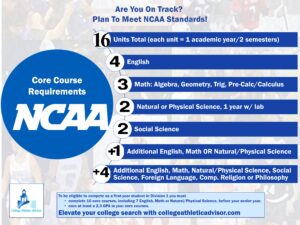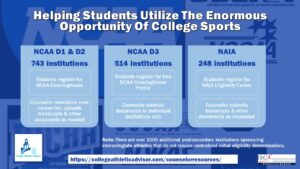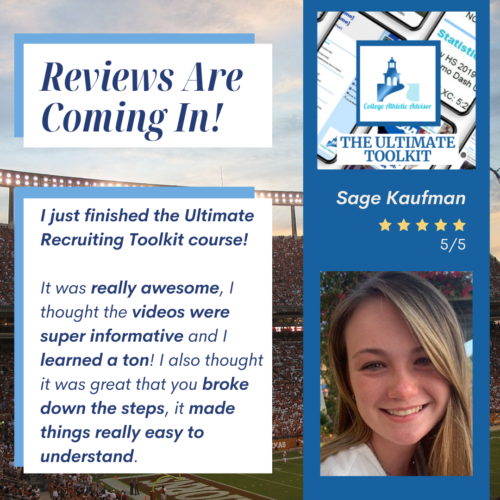Standardized Testing, Initial Eligibility & Admissions
Welcome to our updated explainer on standardized testing. Feel free to share/reprint or utilize graphics with attribution!
If you feel you "need" to take the ACT or SAT, we get you. That's what everyone's been saying (hand up, me too) for years. But things are different now...
The NCAA has now officially dropped standardized testing as an initial eligibility requirement. Moving forward, the NCAA’s criteria will be a student’s GPA in their “core coursework.” This has several implications for aspiring student-athletes, so here is the best information we can share at this time.
You do NOT have to take the SAT/ACT if you are ONLY taking it for NCAA eligibility. This is a significant change, and leads to a number of follow up questions:
Does this mean I should not take the SAT/ACT? The answer to this is “it depends.”
- Are you a pretty good test taker? If you are, a strong score is one more positive data point in your academic profile.
- Where do you live? If you live in Florida or Georgia, the public colleges require tests, in California they will not even consider them, it makes a difference.
- Are you a homeschool student? If so, testing can be a strong “validation,” AP tests, state standard tests, or college courses can ALSO strengthen your academic profile, but if you feel your score will reflect well on your academic record, it may be wise to test.
- Are you unlikely to get a test score that is better than your GPA would predict or have other priorities you want to invest your time in? (https://blog.prepscholar.com/sat-gpa-conversion-table) It may NOT make sense to invest time on test prep if it takes away from either the quality of your classroom performance, or interferes with other activities you value.
I keep hearing I will need a test score to get “merit” scholarships…
- Forgoing testing can cost you money if you live in states that require them for tuition discounts and other state programs (i.e. Bright Futures in Florida or Zell Miller Scholarships in Georgia). Check with your school counselor!
- About 70% of US colleges will remain test optional or test blind going forward. At these schools, both public and private, they are bringing their financial aid/award programs into alignment with admissions. There is no point for a school to admit students and then try to charge them extra compared to their similar peers – and it is not happening.
- There ARE a few institutions that significantly disadvantage test optional students in admissions. If one of these schools in high on your list… you need to at least try to test.
- This is an issue at a vanishingly small number of schools. If you decide to apply test optional, you have an AMAZING range of schools, including EVERY Ivy League college – none of which link test scores to discounts.

What if a coach asks for test scores?
- If you have a score (or scores), share it (them)!! The coach is only trying to help and will tell you if you should apply test optional if you are admissible!
- Coaches are often told to get every possible piece of your admissions profile for evaluation. You can say, “I am applying test optional.” The coach will advise you from there!
What about the NAIA?
They have already adopted the “single criterion eligibility model.” In other words, you can qualify for initial eligibility based on your official high school GPA.
Is this another terrible “dumbing down” of our failing educational system?
- Not at all. Standardized testing contributes very little to the process of predicting whether students are successful or not in college, which is their stated purpose. Depending on whether you uncritically accept the testing industry’s research (which shows a weak correlation between higher test scores and college success) or more independent research (which shows almost little or no correlation), it is pretty clear that colleges can evaluate students without this tool and, in fact, discontinuing use makes the admissions process better in many instances for both students and colleges.
You are just a coach and consultant; can I get some REAL expert opinions?
Absolutely! I suggest these three sources as being particularly up to date and valuable:
- Fair Test (the "official" website of test optional/test blind admissions)
- Akil Bello (one of America’s pre-eminent experts on testing and educational research)
- Applerouth (a well respected and ethical tutoring company that offers extensive test prep, both free & paid)
Each of these shares high quality information with ALL students and parents.
All this aside, some people are going to feel they need to take standardized tests. My analysis indicates testing remains beneficial for students from wealthier zip codes where average scores tend to be high, especially if the student's GPA is below the top 25% in their high school. Students who fit this profile are most likely to get standardized test scores that are higher than their GPA would predict, and these scores can result in higher likelihood of admission or more generous tuition discounts. If your test score is in concordance with your GPA or lower, submitting scores is less likely to benefit your admissions or financial aid opportunities.
As always, if you are looking for individualized or institutional consulting help, check out our services here! You can make an initial appointment through the link on our homepage! School counselors, access our free resources and programs for school collaboration here.
For more information, contact Dave Morris, College Counselor & CEO, College Athletic Advisor
email: [email protected] or phone: (719) 248-7994
©2022 All Rights Reserved
Attention School Counselors & Educators!
Explore our free resources and collaborative tools here:
https://collegeathleticadvisor.com/counselorresources/




